Agenda
Registration and coffee
Opening keynote: An overview of global and national trends and their impact on the M&A market
2024 began with numerous challenges on both international and national fronts. Despite macroeconomic uncertainties and instability, Italian market operators maintain an optimistic view of the next 12 months, with a positive outlook on the M&A and private equity markets. The first two quarters of the year have shown a prudent approach to deal-making, though the number of deals since January 2024 has remained consistent with 2023 levels. The main drivers of Italy's economy for 2024 are likely to be increased internationalisation, energy and technology transitions, and the strengthening of national infrastructure. In this respect, the Italian 'National Recovery and Resilience Plan', operating within the framework of the 'Next Generation EU' programme, is expected to play an increasingly crucial role and provide a significant boost to relevant industries. This keynote will examine current macroeconomic trends and their impact on the PE and M&A markets in Italy.
Panel: Italian M&A and Private Equity trends and drivers for 2025
In recent years, the Italian M&A market has shown resilience, defying economic headwinds with moderate recovery and strong transaction volumes despite high financing costs. Deal values have trended upward since a 3-year low in Q1, with luxury consumer brands—a sector where Italy excels—contributing significantly to this momentum. Large financial sponsor-backed deals continue to succeed, albeit irregularly. The global appeal of Italian craftsmanship and high-end products continues to drive strategic M&A activities and attract international investors, underscoring the enduring strength of the 'Made in Italy' brand. This panel will analyse key market and sector trends shaping the next 12 months, exploring how Italy's dynamic market may continue to withstand adverse macroeconomic conditions.
- How are firms driving growth and creating value through advanced tools and diligence methods, technology innovation and cybersecurity advancements, and new talent integration strategies?
- What opportunities and challenges does the Italian mid-size market present? What is its acquisition potential? How are succession issues impacting M&A activity?
- How are Italian funds internationalising? Which geographies are they targeting? What strategies and models are proving most effective for delivering returns?
- Which alternative asset classes are most effective in delivering returns for investors?
- Which sectors should we watch in 2025? How are retail and consumer sectors evolving? What developments are occurring in advanced manufacturing and mobility? How is the digital sector transforming? What opportunities does the emerging 'silver economy' present
Panel: Entering a new phase of dealmaking – Portfolio management strategies to support deal activity and build resilience
The current macroeconomic landscape continues to evolve with high levels of uncertainty. However, investors in Italy are showing encouraging flexibility and adaptability as they seek to understand and manage external risks while prioritising what they can control. A degree of stabilisation and optimism has emerged, reflected in robust capital raising and sustained deployment activity. In 2023, private equity accounted for no less than 60% of all deal value, with the largest deals orchestrated by overseas funds. Consequently, the value creation playbook for investors has rapidly shifted from financial leverage and multiple expansion to operational initiatives focused on growing revenues and earnings margins. This panel will discuss the implications for private equity deal-making, exploring business transformation challenges, including digitalisation and energy transition, and how these factors will stimulate private equity funds' role as enablers and accelerators of change.
- What are the best value creation strategies amid higher cost leverage and limited financing access? How are risk management practices evolving? What approaches are effective for business transformation? How are innovation, digitalisation, and generative AI being leveraged?
- How are regulatory and legislative updates impacting dealmaking? What are the effects on origination? How is due diligence changing? What new considerations are arising in deal execution?
- How are mid-size companies performing? What trends are emerging in the Italian start-up market? How is growth capital evolving? What opportunities do scale-ups present?
- How can investors benefit from vintage portfolios, pent-up buyer demand, and a backlog of failed sale processes?
- What lies behind a successful portfolio in terms of matching GP strategies and LP expectations?
Coffee and networking
Panel: Private credit outlook – Innovation in M&A financing and growing opportunities for the Italian market
The resilience of M&A in Italy, coupled with increased involvement of international financial investors, underscores the attractiveness and flexibility of Italian mid-cap private companies in challenging times. However, the end of cheap money and shifting bank credit availability has created a more challenging environment for both strategic buyers and sponsors. This session will examine how corporates have adapted to financing M&A deals with leveraged loans, private credit, and high-yield bonds. We'll explore the changing dynamics of sponsor M&A activities and the impact of macroeconomic factors on private credit, anticipating continued growth and evolution in this market segment.
- What factors are driving tighter lending conditions? How can companies seeking leveraged finance adapt their strategies? What funding options exist for growth or acquisitions?
- What advantages do alternative lenders offer? How can businesses leverage private credit funds?
- How are hybrid capital solutions evolving? What's the ideal balance between debt and equity? How is the role of banks changing? Is pricing affecting valuation, and if so, how?
- What opportunities exist for sponsor-less lending in the mid-cap segment?
- How does international interest in Italian assets impact the landscape? What are the implications for competition? How might lending practices in the region change?
In-conversation: Impact investment deep dive – Is ESG at a crossroad?
The sustainable investing environment is rapidly evolving, with ESG funds experiencing significant growth and companies' ESG performance under intense scrutiny. However, the Italian market shows signs of contraction, with certain sectors being avoided by investors completely and mounting regulatory pressure. This conversation will explore whether ESG investing is at a crossroads and what it might look like in the coming years as regulators in the EU, US, and other regions finalise new rules. Our expert speakers will share best practices on leveraging ESG as an opportunity for value creation.
- How is the lack of measurable data and empirical track records within PE impacting transactions?
- What legal and social challenges is ESG facing in Italy? How are rating inconsistencies and lack of standardisation affecting ESG implementation? What labour law complexities are impacting ESG practices? How is regulatory uncertainty influencing ESG strategies and reporting? What social controversies are emerging around ESG initiatives in Italy?
- How is ESG becoming a dominant factor in due diligence and a core belief, including a more discerning approach to asset selection, increased control over deals, and a stronger focus on operational excellence?
- How are consistency and comparability issues being addressed through in-house ESG indicators, metrics, and ratings? What is the role of boards considering their competencies and efficiency?
- How are companies managing the cost vs. opportunity balance? How will companies reach targets for environmental, climate, social, and governance compliance? What are the implications of Article 8 and Article 9 on ESG investing?
Panel: Italian Private Equity deployment and exit opportunities
This panel will delve into the intricacies of the Italian PE fundraising landscape, current drivers, best practices to enhance efforts, and the increasing emphasis on transparency and trust in LP-GP relationships. We'll explore how secondary activity, including continuation vehicles and preferred equity, is being utilised by GPs to optimise fund management and provide more dynamic exit options.
- What is the current valuation landscape in Italy? What are the successful exit opportunities for funds? How is the stabilisation of interest rates impacting PE transactions? How might this influence investment strategies, deal structures, and returns?
- Which factors have contributed to deal value and volume fluctuations in 2024? How can investors navigate this landscape to maximise investment value? How can they leverage the narrowing valuation gap?
- What's the status of IPOs and carve-out activity in Italy? Is there more talk than action?
- How are the secondary market, continuation funds, and capability investing shaping exit strategies? How can sponsors secure their capital structures in the current scenario?
Networking lunch
Conference close
Confirm cancellation
An error occurred trying to play the stream. Please reload the page and try again.
CloseSign-up to join the ION Analytics Community to:
- Register for events
- Access market insights
- Download reports


 play_arrow
play_arrow


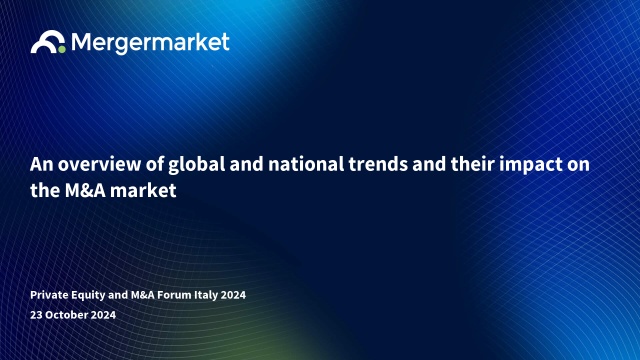 play_arrow
play_arrow







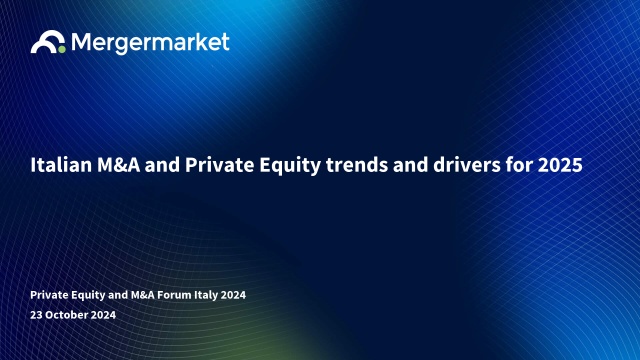 play_arrow
play_arrow






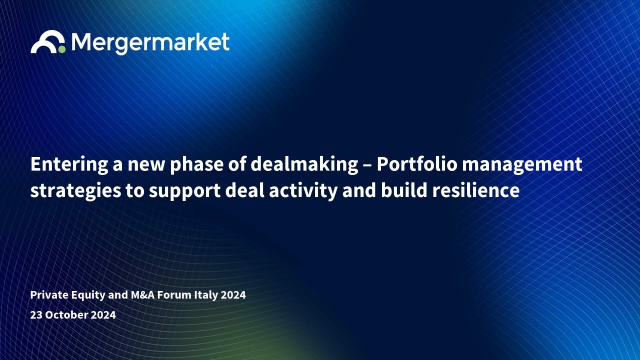 play_arrow
play_arrow





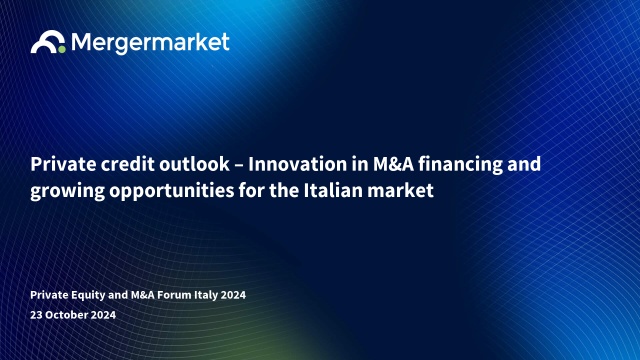 play_arrow
play_arrow


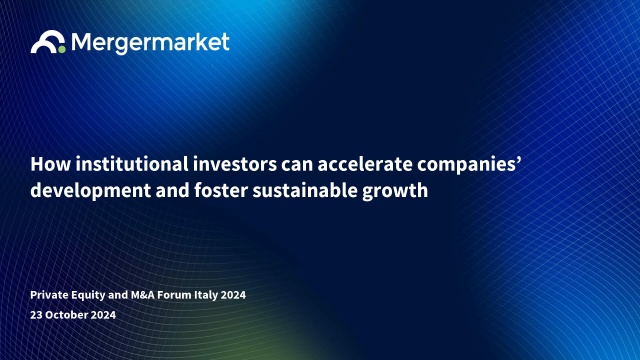 play_arrow
play_arrow


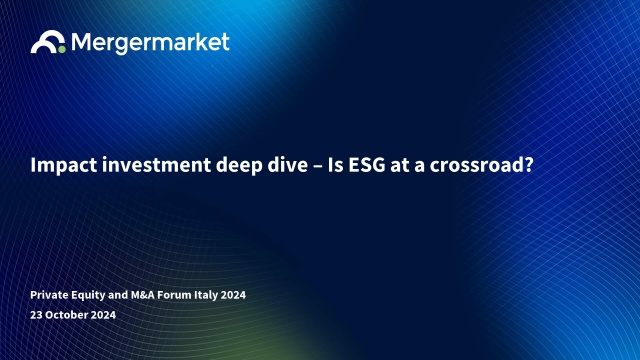 play_arrow
play_arrow






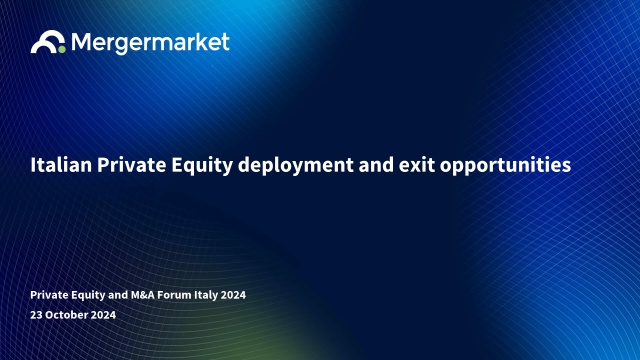 play_arrow
play_arrow
 play_arrow
play_arrow














